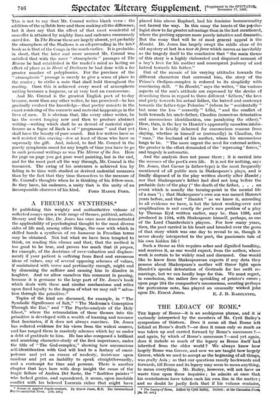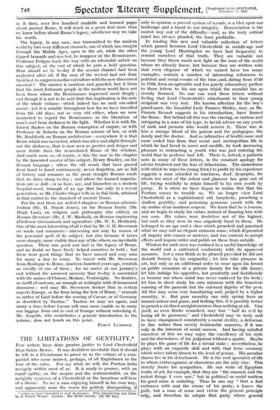THE LEGACY OF ROME.*
THE legacy of Rome—it is an ambiguous phrase, and it variously interpreted by the members of Mr. Cyril Bailey's symposium of thirteen. Does it mean all that Rome left behind at Rome's death ?—or does it mean only so much as was taken up and carried forward by Rome's successors ?- and again, by which of Rome's successors ?—and yet again, does it include so much of the legacy as Rome itself had inherited from the older world ? We- always knew how largely Rome was Greece, and now we are taught how largely Greece, which we used to accept as the beginning of all things, was really Asia ; so that our questions ramify backwards and forwards, till Rome and its.legacy may seem to mean anything, to mean everything. Mr. Bailey, however, will not have us waste time upon these inquiries ; he admits at once that his contributors have taken each his own_line in the matter ; and no doubt he justly feels that if his volume contains, • The Legacy of Reese, &Med by Cyril Bailey, Oxford: at tbs-Olaroadon,Presed prom. net.1
as it does, over five hundred readable and learned pages about ancient Rome, it will teach us a great deal more than we knew before about Rome's legacy, whichever way we take the words.
The legacy, in any case, was transmitted to the modern world by two very different channels, one Of Which ran straight through the Middle Ages, open to the air, while the other dipped beneath and was lost, to reappear at the Renaissance. Professor Foligno leads the way with an admirable article on this subject, at the end of which he puts a bold question. How should we be to-day if the second channel had been neglected after all, if the men of the revival had not done their best to suppress mediaeval culture with the new-discovered classical ? The answer is cautious and guarded, but it hints that the most fortunate people in the modern world have not been those whom the Renaissance impressed most deeply ; and though it is not to be said that this implication is the note of the whole volume—which indeed has no such one-sided moral—yet it is notable throughout how far we have travelled from the old days, not so very old either, when we were instructed to regard the Renaissance as the liberation of man's soul from darkness to the light. Whether it is with Dr. Ernest Barker on the Roman conception of empire, or with Professor de Zulueta on the Roman science of law, or with Mr. Rushforth on Roman architecture—everywhere it is that Rome which was never lost, which was alive and alight through- out the darkness, that is now seen as greater and deeper and more fertile than the resuscitated Rome of the scholars. And much more so, of course, is this the case in the chapter by the lamented master of his subject, Henry Bradley, on the Roman language ; where the old words that have passed from hand to hand continuously, never forgotten, are as full of history and romance as the great straight Roman roads that we drive along to-day ; and where the learned importa- tions are as dull—or as bare, say, and blameless as a modern hospital-ward, triumph of an age that has only in a recent generation, so Mr. Charles Singer tells us in this book, attained in that matter to the standard of ancient Rome.
For the rest there are well-fed chapters on Roman adminis- tration (Mr. II. Stuart Jones), on the Roman family (Mr. Hugh Last), on religion and philosophy (the editor), on Roman literature (Mr. J. W. Mackail), on Roman engineering (Professor Giovannoni) and agriculture (Mr. W. E. Heitland). One of the most interesting of all is that by Mr. G. H. Stevenson on roads and commerce—interesting not only by reason of the perennial spell of its subject, but also because it raises more sharply, more visibly than any of the others, an inevitable question. There was good and bad in the legacy of Rome, and no doubt we have freely helped ourselves to both ; but there were good things that we have missed and may miss for many a day to come. To travel with Mr. Stevenson from Boulogne to Rome, nineteen hundred years ago, reminds us vividly of one of these ; for we arrive at our journey's end without the accursed memory that to-day is associated with the names of Chiasso, Modane, Ventimiglia. No frontier, no tariff of customs, no wrangle at midnight with ill-humoured douaniers : well may Mr. Stevenson declare that in certain aspects Europe, so far from being the heir of Rome, "reminds us rather of Gaul before the coming of Caesar, or of Germany as described by Tacitus." Tacitus we may see again, and many a time, before Caesar will once more enable us to carry our luggage from end to end of Europe without unlocking it. Mr. Asquith, who contributes a general introduction to the volume, does not touch on this point.
PERCY LUBBOCK.



























































 Previous page
Previous page